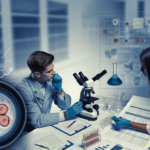“Discover how advanced testing solutions are revolutionizing global healthcare, improving accuracy and efficiency in diagnosis and treatment.”
Addressing Global Healthcare Challenges with Advanced Testing Solutions

Table of Contents
- Introduction
- The Role of Precision Medicine in Tackling Global Healthcare Challenges
- Advancements in Genetic Testing for Improved Diagnosis and Treatment
- The Impact of Point-of-Care Testing on Access to Healthcare in Developing Countries
- Addressing Antibiotic Resistance with Rapid and Accurate Microbiology Testing
- Q&A
- Conclusion
“Empowering the world’s health through cutting-edge testing solutions.”
Introduction
The global healthcare industry is facing numerous challenges, from rising costs and limited resources to the emergence of new diseases and the need for more accurate and efficient diagnostic tools. In order to address these challenges, advanced testing solutions have become increasingly important in the healthcare sector. These solutions utilize cutting-edge technology and innovative techniques to provide accurate and timely diagnoses, leading to better treatment outcomes and improved patient care. In this article, we will explore how advanced testing solutions are helping to overcome global healthcare challenges and revolutionizing the way healthcare is delivered.
The Role of Precision Medicine in Tackling Global Healthcare Challenges
In today’s world, healthcare challenges are becoming increasingly complex and widespread. From infectious diseases to chronic illnesses, the burden on healthcare systems is growing. This is especially true in developing countries, where access to quality healthcare is limited. In order to address these challenges, advanced testing solutions are playing a crucial role. Among these solutions, precision medicine is emerging as a powerful tool in tackling global healthcare challenges.
Precision medicine, also known as personalized medicine, is an approach that takes into account an individual’s genetic makeup, lifestyle, and environment to tailor medical treatments. This approach is based on the understanding that each person’s genetic makeup is unique, and therefore, their response to a particular treatment may vary. By utilizing advanced testing methods, precision medicine aims to provide targeted and effective treatments for patients.
One of the key benefits of precision medicine is its ability to improve patient outcomes. By analyzing a patient’s genetic information, doctors can identify the most suitable treatment for their condition. This not only increases the chances of successful treatment but also reduces the risk of adverse reactions. In the case of infectious diseases, precision medicine can help identify the specific strain of the pathogen and determine the most effective treatment, thus reducing the spread of the disease.
Moreover, precision medicine can also play a crucial role in addressing the issue of antibiotic resistance. With the overuse and misuse of antibiotics, many bacteria have become resistant to these drugs, making it difficult to treat infections. Precision medicine can help identify the specific bacteria causing the infection and determine the most effective antibiotic to target it. This not only improves patient outcomes but also helps in the fight against antibiotic resistance.
Another significant advantage of precision medicine is its potential to reduce healthcare costs. By providing targeted treatments, precision medicine can minimize the need for trial and error in finding the right treatment for a patient. This can save both time and resources, ultimately reducing the overall cost of healthcare. Additionally, by identifying individuals who are at a higher risk of developing certain diseases, precision medicine can help in early detection and prevention, which can also lead to cost savings in the long run.
In the context of global healthcare challenges, precision medicine has the potential to bridge the gap between developed and developing countries. With advanced testing solutions, genetic information can be easily collected and analyzed, even in remote areas. This can help in identifying and treating diseases that are prevalent in specific regions, thus improving the overall health of the population. Furthermore, precision medicine can also aid in the development of targeted therapies for diseases that disproportionately affect certain populations, such as sickle cell anemia in African countries.
However, the implementation of precision medicine in tackling global healthcare challenges is not without its challenges. One of the main obstacles is the high cost of genetic testing and analysis. This can limit access to precision medicine in developing countries, where healthcare resources are already scarce. Additionally, there are concerns about the privacy and ethical implications of collecting and storing genetic information. These challenges must be addressed to ensure the responsible and equitable use of precision medicine in addressing global healthcare challenges.
In conclusion, precision medicine is a promising approach in tackling global healthcare challenges. By utilizing advanced testing solutions, it has the potential to improve patient outcomes, reduce healthcare costs, and bridge the gap between developed and developing countries. However, it is essential to address the challenges and concerns surrounding its implementation to ensure its responsible and ethical use. With continued advancements in technology and collaboration between healthcare professionals and researchers, precision medicine can play a significant role in improving the health of individuals and populations worldwide.
Advancements in Genetic Testing for Improved Diagnosis and Treatment

In recent years, there has been a significant increase in the use of genetic testing for diagnosis and treatment of various diseases. This advancement in technology has revolutionized the field of healthcare, providing healthcare professionals with a powerful tool to better understand and treat diseases. With the help of advanced testing solutions, healthcare providers can now identify genetic mutations and variations that may contribute to the development of diseases, allowing for more personalized and effective treatment plans.
One of the major challenges in global healthcare is the accurate and timely diagnosis of diseases. Traditional diagnostic methods often rely on symptoms and physical examinations, which can be subjective and may lead to misdiagnosis. This is where genetic testing comes in, providing a more objective and precise approach to diagnosis. By analyzing an individual’s genetic makeup, healthcare professionals can identify any genetic predispositions to certain diseases, allowing for early detection and prevention.
Moreover, genetic testing has also proven to be a valuable tool in the treatment of diseases. With the help of advanced testing solutions, healthcare providers can now tailor treatment plans based on an individual’s genetic profile. This personalized approach to treatment has shown to be more effective, as it takes into account the unique genetic makeup of each patient. This not only leads to better treatment outcomes but also reduces the risk of adverse reactions to medications.
One of the most significant advancements in genetic testing is the development of next-generation sequencing (NGS) technology. NGS allows for the rapid and cost-effective sequencing of an individual’s entire genome, providing a comprehensive analysis of their genetic makeup. This technology has greatly improved the accuracy and efficiency of genetic testing, making it more accessible to a larger population.
Another major advancement in genetic testing is the use of liquid biopsy. This non-invasive method involves the analysis of circulating tumor DNA (ctDNA) in the blood, providing a less invasive alternative to traditional tissue biopsies. Liquid biopsy has proven to be particularly useful in the early detection and monitoring of cancer, as it can detect genetic mutations associated with cancer cells. This allows for more timely and accurate treatment, leading to better outcomes for patients.
Furthermore, the use of artificial intelligence (AI) in genetic testing has also shown promising results. AI algorithms can analyze vast amounts of genetic data and identify patterns that may not be apparent to the human eye. This has the potential to improve the accuracy and efficiency of genetic testing, leading to more precise diagnoses and treatment plans.
Despite the numerous benefits of genetic testing, there are also ethical considerations that need to be addressed. The use of genetic information raises concerns about privacy and discrimination. Therefore, it is crucial for healthcare providers to ensure the confidentiality and security of genetic data and to adhere to strict ethical guidelines.
In conclusion, advancements in genetic testing have greatly improved the diagnosis and treatment of diseases, addressing some of the major challenges in global healthcare. With the help of advanced testing solutions such as NGS, liquid biopsy, and AI, healthcare professionals can now provide more personalized and effective care to their patients. However, it is essential to continue to address ethical concerns and ensure the responsible use of genetic information. As technology continues to advance, the potential for genetic testing to revolutionize healthcare is immense, and it is crucial to embrace these advancements for the betterment of global healthcare.
The Impact of Point-of-Care Testing on Access to Healthcare in Developing Countries
In today’s world, access to quality healthcare is a major concern, especially in developing countries. Limited resources, inadequate infrastructure, and a shortage of trained healthcare professionals are some of the challenges faced by these countries. As a result, many people in these regions do not have access to timely and accurate medical diagnosis, leading to delayed treatment and poor health outcomes.
However, with the advancement of technology, there has been a significant improvement in the field of medical testing. Point-of-care testing (POCT) has emerged as a game-changer in addressing the global healthcare challenges faced by developing countries. POCT refers to medical diagnostic testing that is performed at or near the site of patient care, providing immediate results. This technology has the potential to revolutionize healthcare delivery in developing countries, particularly in terms of access to healthcare.
One of the major benefits of POCT is its ability to provide rapid and accurate results. In developing countries, where access to healthcare facilities is limited, this can be life-saving. With POCT, patients can receive a diagnosis and treatment plan in a single visit, eliminating the need for multiple trips to a healthcare facility. This is especially crucial in remote areas where transportation is a major barrier to accessing healthcare.
Moreover, POCT devices are portable and easy to use, making them suitable for use in resource-limited settings. These devices are designed to be user-friendly, requiring minimal training to operate. This means that even healthcare workers with limited training can perform tests and provide immediate results, reducing the burden on already overworked healthcare professionals.
Another significant advantage of POCT is its cost-effectiveness. Traditional laboratory testing requires specialized equipment, trained personnel, and a well-equipped laboratory, making it expensive and time-consuming. In contrast, POCT devices are relatively affordable and can be used in a variety of settings, including remote and rural areas. This makes it possible to bring healthcare services closer to the people, improving access to medical care.
In addition to improving access to healthcare, POCT also has the potential to improve patient outcomes. In developing countries, where many people do not have access to regular medical check-ups, diseases are often diagnosed at an advanced stage, making treatment more challenging and expensive. With POCT, diseases can be detected early, allowing for timely treatment and better health outcomes.
Furthermore, POCT can also play a crucial role in disease surveillance and outbreak control. In developing countries, where infectious diseases are prevalent, early detection and containment are crucial in preventing the spread of diseases. POCT devices can be used to quickly identify and diagnose infectious diseases, allowing for prompt treatment and control measures to be implemented.
However, despite its potential, the widespread use of POCT in developing countries faces some challenges. One of the main challenges is the lack of regulatory frameworks and quality control measures. In many developing countries, there is a lack of regulations and standards for POCT devices, leading to concerns about the accuracy and reliability of test results. This can be addressed by implementing quality control measures and ensuring that POCT devices meet international standards.
In conclusion, POCT has the potential to address the global healthcare challenges faced by developing countries. Its ability to provide rapid and accurate results, cost-effectiveness, and portability make it a valuable tool in improving access to healthcare. However, to fully realize its potential, there is a need for collaboration between governments, healthcare organizations, and technology providers to ensure the proper implementation and regulation of POCT devices. With the right strategies in place, POCT can play a significant role in improving healthcare outcomes and reducing health disparities in developing countries.
Addressing Antibiotic Resistance with Rapid and Accurate Microbiology Testing
The rise of antibiotic resistance has become a major global healthcare challenge in recent years. According to the World Health Organization (WHO), antibiotic resistance is one of the biggest threats to global health, food security, and development today. It occurs when bacteria, viruses, fungi, and parasites evolve and become resistant to the drugs used to treat infections. This makes it difficult to effectively treat common infections, leading to longer hospital stays, higher healthcare costs, and increased mortality rates.
One of the key factors contributing to the rise of antibiotic resistance is the overuse and misuse of antibiotics. This includes the unnecessary prescription of antibiotics for viral infections, as well as the use of antibiotics in agriculture and animal husbandry. As a result, bacteria are constantly exposed to antibiotics, allowing them to develop resistance and spread to other individuals and communities.
To address this global healthcare challenge, there is a growing need for advanced testing solutions that can accurately and rapidly identify antibiotic-resistant bacteria. Traditional microbiology testing methods, such as culture-based techniques, are time-consuming and can take days to produce results. This delay in diagnosis and treatment can have serious consequences for patients, especially those with life-threatening infections.
Fortunately, advancements in technology have led to the development of rapid and accurate microbiology testing solutions. These innovative tools use molecular techniques to detect and identify bacteria, viruses, and fungi in a matter of hours, rather than days. This allows healthcare professionals to quickly determine the most effective treatment for their patients, reducing the risk of antibiotic resistance and improving patient outcomes.
One such solution is the use of polymerase chain reaction (PCR) technology. This technique amplifies specific DNA sequences of bacteria, allowing for their rapid detection and identification. PCR-based tests can accurately identify antibiotic-resistant bacteria, such as methicillin-resistant Staphylococcus aureus (MRSA) and vancomycin-resistant Enterococcus (VRE), in a matter of hours. This enables healthcare professionals to prescribe the appropriate antibiotics and prevent the spread of these resistant bacteria.
Another advanced testing solution is the use of mass spectrometry. This technique can rapidly identify bacteria and their antibiotic resistance profiles by analyzing their protein composition. Mass spectrometry-based tests can provide results in as little as 30 minutes, allowing for timely and effective treatment of infections.
In addition to rapid and accurate detection, these advanced testing solutions also offer other benefits. They require minimal sample preparation, reducing the risk of contamination and human error. They also have a higher sensitivity and specificity compared to traditional culture-based methods, resulting in fewer false-positive and false-negative results.
Furthermore, these advanced testing solutions can also aid in the surveillance and tracking of antibiotic resistance. By quickly identifying resistant bacteria, healthcare professionals can monitor the spread of these bacteria and implement appropriate infection control measures to prevent outbreaks.
The use of advanced testing solutions is not limited to hospitals and healthcare facilities. They can also be utilized in community settings, such as primary care clinics and long-term care facilities. This allows for early detection and management of infections, reducing the need for hospitalization and the use of broad-spectrum antibiotics.
In conclusion, addressing the global healthcare challenge of antibiotic resistance requires a multi-faceted approach. Advanced testing solutions, such as PCR and mass spectrometry, play a crucial role in the rapid and accurate detection of antibiotic-resistant bacteria. By providing timely and effective treatment, these innovative tools can help reduce the spread of antibiotic resistance and improve patient outcomes. It is essential for healthcare professionals to embrace these advancements and incorporate them into their practice to combat this growing threat to global health.
Q&A
1. What are some of the major global healthcare challenges that can be addressed with advanced testing solutions?
Some of the major global healthcare challenges that can be addressed with advanced testing solutions include infectious diseases, chronic diseases, and limited access to healthcare in developing countries. Advanced testing solutions can also help with early detection and prevention of diseases, personalized treatment plans, and improving overall healthcare efficiency and effectiveness.
2. How can advanced testing solutions help with infectious diseases?
Advanced testing solutions can help with infectious diseases by providing accurate and timely diagnosis, which is crucial for effective treatment and prevention of further spread. These solutions can also aid in identifying the specific pathogen causing the disease, allowing for targeted treatment and reducing the risk of antibiotic resistance. Additionally, advanced testing can help with surveillance and tracking of infectious diseases, providing valuable data for public health interventions.
3. In what ways can advanced testing solutions improve healthcare in developing countries?
Advanced testing solutions can improve healthcare in developing countries by providing access to accurate and affordable diagnostic tools. This can help with early detection and treatment of diseases, reducing the burden on healthcare systems and improving overall health outcomes. These solutions can also be used for remote testing, allowing for healthcare services to reach remote and underserved areas.
4. How can advanced testing solutions contribute to personalized treatment plans?
Advanced testing solutions can contribute to personalized treatment plans by providing detailed information about an individual’s genetic makeup, disease risk factors, and response to certain treatments. This allows for tailored treatment plans that are more effective and have fewer side effects. Additionally, advanced testing can help with monitoring treatment progress and adjusting plans as needed, leading to better health outcomes for patients.
Conclusion
In conclusion, advanced testing solutions have the potential to address many of the global healthcare challenges we face today. These solutions can improve the accuracy and efficiency of diagnoses, leading to better treatment outcomes and reduced healthcare costs. They also have the ability to detect diseases at an early stage, allowing for timely intervention and prevention. Additionally, advanced testing solutions can help identify and track disease outbreaks, aiding in the control and management of pandemics. With continued advancements in technology and increased access to these solutions, we can overcome many of the challenges facing the global healthcare system and improve the overall health and well-being of individuals worldwide.








